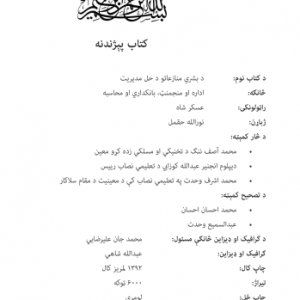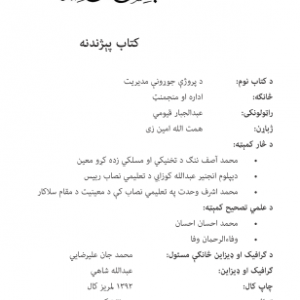About ( دعامه اړیکو پالیسي): You can read short details of the book above. If You want to get the book ( دعامه اړیکو پالیسي), than just click on DOWNLOAD FREE Bottom, wait and the download will start to your Mobile/PC.
More from Easylibrary.org: د مکتب نصاب کتابونه, Afghanistan Provinces & Districts Maps (Pdf)
Quotes
Afghanistan’s water source, an important research topic
In the discussion of the economy of natural resources and environmental assets, water is a flow resource, whether it is used or not, it is lost. The characteristic of this biological resource is different from storage and synthetic resources, so it should be called a strategic resource. We will be able to manage this precious and vital resource well when we turn it into a subject of scientific research. It is very important to give it a place in the series of research institutions of natural resources. Fortunately, now the technology of hydrology and hydrometry is easily available and knowledge is not difficult.
So far, we have very little scientific research on Afghanistan’s water (especially compared to other countries). You still haven’t reached an agreement on how to divide the water basin of your country into several basins. (FAO) fifty-five years ago, Afghanistan’s irrigation basin had shown three (?). Later, five areas were defined. We have held scientific conferences on water sources and irrigation basins in the Afghanistan Academy of Sciences several times. We had two conferences at the Intercontinental Hotel with the participation of water experts and managers of a number of projects and officials of the Ministry of Water and Energy. One of our proposals was to redefine the irrigation basin. Professor Jilani Arz and Professor Thaniwal welcomed this proposal.
What are these six constituencies?
The administration of local bodies of Afghanistan has a division according to the needs of the government, a number of independent institutions and commissions (such as human rights, elections, etc.) In addition to this, we have climatic zones, which have not yet been defined as a result of scientific research, flora and fauna have not been determined. This requires a special research institution of its own. Especially Afghanistan has several micro climates in a small area due to a very strange and rare feature. Such as southern and northern Salang (where two types of climate are distinguished in a short distance), while a continent (a large country) like Australia has very little diversity of climate.
In any order; Distribution of natural resources, especially watersheds, is an economic necessity. For this we have to do scientific research. Water is essential for energy production, drinking, industry, agriculture and livestock. We need studies of diversion, storage… dams for electricity generation. And likewise, another important need is for drinking and another for agriculture. Here we will shed some light on irrigation basins in the agriculture sector:
The development of existing wetlands is vital for agronomy, horticulture and animal feeding and for the economic development of the country. At present, agricultural land that is irrigated annually is 2 million hectares (the land under our irrigation does not exceed 11% of the total area of the country, which is under the invasion of non-agricultural use every day). There are many hopes to increase this amount, and that is to restore the infrastructure that was destroyed during the years of war.
Read more: Afghanistan Jobs , Articles ,+Publish your Books







Reviews
There are no reviews yet.